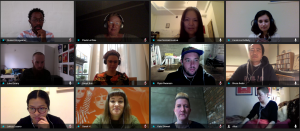Film by Joe Jones and Henrique Ghersi with music by Fred Deakin.
In 1898 British writer Arthur Mee said of the invention of the telephone, ‘…if, as it is said to be not unlikely in the near future, the principle of sight is applied to the telephone as well as that of sound, earth will be in truth a paradise, and distance will lose its enchantment by being abolished altogether’ (The Pleasure Telephone, Strand Magazine). Mr Mee, it seems, may have had a point.
With high speed internet and digital tools like Skype and social media now a part of everyday life for most people, communicating with friends and colleagues in far off places has never been easier. It is often more common to meet with people in the virtual world than it is face to face.
Our Research Question
One of the major areas of research for Creative Producers International is developing an effective model of digital communication for international collaboration. With a group of 15 Creative Producers dispersed across the world and only one physical meet up possible per year, the ability to collaborate at distance is vital for the success of our programme – both in maintaining our momentum and for keeping alive the strong bond between the cohort that began so successfully during their time here at Watershed last year. Emails and the occasional Skype call can only go so far…
As well as this, another important outcome for us extends beyond the end of programme; we want to create a network of people and cities who can influence, challenge and support each other, and share their experience, knowledge and innovation internationally. In order for this to be sustainable, efficient digital methods of communication are critical.
Creative Producers International has shown us the real benefit of a creative process that involves people from a variety of different backgrounds, disciplines and perspectives. Working internationally expands our horizons and offers a valuable collaborative experience that challenges our cultural bias and makes all of our work better. As award winning composer Julius Dobos said, ‘Working with people who think differently has its own benefits: forms of creative disruption… this is one of the biggest gifts a creative producer can receive: the ability to see into another intellect in which solutions work completely differently’ (The Importance of Collaboration and Teamwork in the Creative Industry).
Yet despite the advances in digital technology, collaborating at distance can present real challenges; from difficulties in finding humane appointments for synchronous communication between different time zones through to subtle cultural differences that can be easily misinterpreted when using digital communication tools.
The need to communicate at distance is naturally one that is shared throughout the creative sector. There are many people involved in interesting experiments that explore the use of digital tools for the benefit of creative endeavours;
Joseph Gordon Levitt’s online company HitRecord is a community-sourced production company that allows people from all over the world to collaborate creatively over the internet. Artists from all kinds of disciplines can contribute raw materials or skills to contribute to creative projects that combine their experience. The company has produced books, art, animation, records, short films and an Emmy Award winning television programme. The OnCreate project was created by ten international universities with expertise in digital learning environments. Its aim is to explore the challenges of facilitating successful creative courses in the digital realm, through evaluating examples of best practice and successful experimental techniques. Bristol based Mayk, producers of the excellent Mayfest are currently working on Out of the Blue (working title), a project that will take place between Bristol (UK), Kigali (Rwanda) and Kampala (Uganda). The project will see one artist from each place collaborate in the creation of a new live performance piece to be performed in each of the cities simultaneously, using digital technology to provide a link between the locations.
First CPI Digital Lab
In order to explore our own methods of digital collaboration, we have designed a digital strand to Creative Producers International, in collaboration with Professor Fred Deakin, UAL Chair of Interactive Digital Art.
At UAL Fred has developed a new type of workshop methodology to ‘explore new ways of teaching creative practice in a post digital world where the internet and its accompanying technological devices have been fully assimilated and are present in all of our lives’ (Rediscovering The Post-Digital Art School). His desire was to equip creative students with new methods of confidently utilising digital platforms. The result was Modual, a model incorporating both physical and online workshops that allows students to work collectively to create dynamic projects aimed at social change. You can read more about Modual here.
Fred’s unique methods were an invaluable starting point for developing a bespoke programme for our first CPI Digital Lab, which we held from 29 January – 2 February 2018, with Fred as our facilitator. The cohort came together for three hours a day across five consecutive days, using a combination of digital tools Fuze and Slack. During our Bristol Residential Lab the cohort provided us with valuable feedback which heavily informed our design process for this element of the programme. They wanted the process of the Digital Lab to feel valuable, meaningful and have real outputs – it was decided that we would create activities for them to deliver for an audience during our next physical meet up in Tokyo in September 2018.
Despite Fred’s expertise, we had real reservations ahead of the Lab; how responsive would they be to the activity? How would we effectively maintain the engagement of a group so large without any face to face connection? And most importantly, how we would ensure the continuation of the atmosphere of trust and openness that has come to define the dynamic of CPI?
Response to the Activity
These concerns helped us focus our key aims for the Lab: get the cohort comfortable working together online, introduce collaborative tools and concepts and for the group to generate ideas.
In December 2017, a month before the Digital Lab began, we began work to ensure these aims would be met. We hosted an end of year party on Fuze that allowed us to celebrate all we had achieved throughout the year, and also provided an important opportunity for us to test the technology and help the Creative Producers get used to working in our new digital space.
Our programme for the week involved a mixture of blue sky thinking, rapid prototyping and theoretical models (e.g. Edward de Bono’s Thinking Hats exercise and Design Council’s Double Diamond), culminating in a voting process which narrowed a long list of potential ideas down to three projects to take forwards and develop for Tokyo in smaller delivery teams. Though several of the cohort admitted to experiencing initial apprehension and scepticism towards the process, we soon found that the technology lost its initial prominence as the Creative Producers became immersed in the creative challenges before them.
Maintaining the Engagement of the Group
Working across 15 cities, and different speeds of internet connection, inevitably there were a number of technical issues to contend with. This was a real challenge for the facilitation team and ran the risk of participants feeling excluded from the activity. Aided by Fred’s calm and skilful facilitation, in reality it provided a great opportunity for the entire group to come together and problem solve. Together the team and participants utilised other digital tools, such as our Slack channel and WhatsApp calls, to keep anyone experiencing problems with Fuze connectivity updated and ensure their continued participation.
The eight time zones we work across on Creative Producers International meant a very early start for Leticia in Mexico City and late evening for Paula in Sydney, which at times was difficult. The digital platform also made it tough to gauge the impact of the communication barriers that we experienced during our time together in Bristol. It is a testament to Fred’s programme and the Creative Producers’ commitment to the process that these potential barriers did not prohibit their successful engagement or the delivery of strong project ideas by the end of the Lab.
These challenges provided important learning for us and we will continue to work on techniques to address them during our activity in Tokyo and next year’s Digital Lab.
Continuing the Atmosphere of Trust and Openness
It was incredibly important that our culture of openness, trust and honesty extended to the digital elements of the programme.
Each day we began with a warm up activity, which is more difficult than you might imagine on a digital platform. A brilliant mixture of recall games, creating poignant prophecies during ‘The Oracle has Spoken’ and being put on the spot by the ever-taxing ‘Yes, and…’ replicated the playfulness of our shared physical space in Bristol and helped us all to feel at ease.
Holding the Lab on Fuze also helped in the creation of a safe space. The programme allows participants to work in separate ‘rooms’, providing the Creative Producers with the opportunity to share openly with each other in a more intimate environment. We also made sure we welcomed the participants’ input by holding regular moments of reflection, vital for helping us make sure the process felt valuable and accessible to the group.

Next Steps
We will continue to explore different techniques for our international collaboration. Our time zone issues mean asynchronous solutions could have an important role, and as our ability to interact on Fuze is dependent on Fred’s generosity in allowing us to use his subscription, a more accessible and sustainable platform feels necessary.
These issues aside, it is difficult to imagine CPI without the digital tools at our disposal. The Creative Producers continue to work over Fuze, our Slack channel is used almost daily for our participants to connect with each other and we all look forward to a selfie in our WhatsApp group when two of us meet in the real world.
We will of course continue to share our learning as we move forwards.
Feedback
We received some excellent feedback from the cohort on the Digital Lab experience:
Leticia Lozano (Mexico City) found beginning her day with the Digital Lab a great warm up to her creative process alongside brilliant minds and she was more productive when she arrived at work.
Anel Moldakhmetova (Almaty) found the Lab to be very inspirational and it opened up lots of ideas for her. While they were going through the activities she thought a lot about her own work, particularly the CPI Development Grant project. She left feeling motivated and inspired.
Ryan Swanson (Tampa) was sceptical at the beginning of the process as he finds conversing over digital platforms off-putting. In contrast, he found the environment of the Digital Lab comfortable and he enjoyed how connected he felt to people despite seeing them through a screen.
Louisa Davies (Stratford-upon-Avon) “…and just to say the Digital Lab was great! Quite an eye opener to work like that and feel it work as a process for me. I am naturally quite a theorist/ reflective person and like to spend lots of time thinking about things – but it made me realise I can flex that approach and come up with ideas quickly.”
